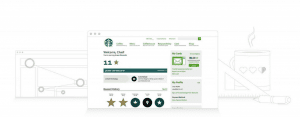More than one in five of the products purchased in retail stores are from private labels. The improved quality of these private-label products gives them more power as compared to competing name brands. Consumers are choosing private-label brands because of their cheaper prices and consistency across multiple channels. Retailers are capturing consumer loyalty with store private-label brands at the expense of the products’ original brands.
What Are Private Labels?
Private labels are products bought in bulk, relabeled, and then sold under the new owner’s name. Their popularity has steadily increased over the past few decades, with many retailers creating their own “specialty lines” of private labels.
Co-branding? Nope.
With private labeling, the only name used on the product is that of the company that bought it. Co-branding, on the other hand, allows both names to be used. It is extremely common in the retail world for brands to create co-branded items that attract one brand’s existing consumers to the new brand’s product.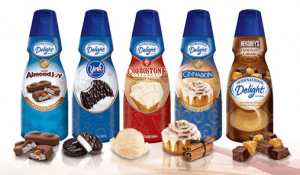
Outsourcing? Nope.
A company that outsources its product still designs the product; it just has another company manufacture it. Private labeling is when Company One designs, manufactures, and then sells a product to Company Two for it to label; outsourcing is when Company Two designs a product and outsources to Company One for manufacturing; Company One then sends the product back to Company Two for its label.
White labels? Not exactly . . .
Although it is common to hear the terms “private labels” and “white labels” used interchangeably, white labels tend to refer to services and private labels to goods. White labels are common in the software industry, such as cloud computing services for brands that don’t have that capability on their own. A popular example of white label software is the Starbucks customer loyalty solution powered by BigDoor.
Fun history fact! According to many sources (all of which lead back to Wikipedia), “white label” originated as a term used to describe pre-released records before the artwork was finished. The promotional record copies were sent to DJs in plain white sleeves, and the term was coined.
The recent shift to quality
Private labels first appeared in the 1970s as low-quality alternatives to brand names with simple black and white packaging. This simple packaging evolved to be more appealing over the years, and the quality of the product increased, as well, with customer interest following. In the past few years, private labels began an upward trend after a stagnant decade.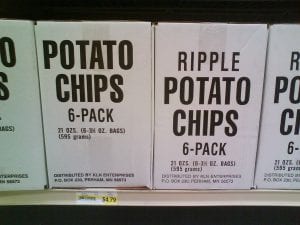
Bloomberg recently addressed why private-label brands have been stagnant in market share with brand names. After a steady increase in popularity around the economic downturn in 2008, their market share leveled out. They have consistently held around 15 percent of the market share in retail stores over the past 5 years. Prior to recent years, private-label brands were viewed as cheaper, low-quality lines. These products are often referred to as the generic lines, and companies traditionally made no efforts in promotion or labeling.
However, “the new wave of investment feels different,” Bloomberg states. Private-label brands are now focusing on quality to compete with name brands and build relationships with their consumers. Because the digital era of retail shopping allows consumers to compare name brand prices online and switch stores for better deals, there is an increased need for retail loyalty. So far, the focus on quality seems to be working; the social stigma against private labels has largely decreased. According to a 2014 report from Nielsen, 75 percent of Americans now believe private labels are a good alternative to name brands.
Amazon’s shopping experience is also an exercise in “retail as a brand.” When you shop on Amazon, the brands themselves are played down, taking up a very small percentage of the screen; the products are instead sorted by reviews, price, or Amazon’s Choice, which will most likely default to Amazon-owned brands. The quality and trustworthiness of the products speak not for the producers but for the Amazon brand, which retains customers’ loyalty.
Why private label?
Retailers love using private labels, though name brands hate the competition. Consumers are resisting name-brand marketing strategies and instead purchasing private-label brands with high consistency and low prices.
Quick and easy to brand
Private labels are easy; it’s as simple as that. The product is ready-made and only needs to be branded, saving time and money that would typically go into research and development.
Keeps customers happy
Consumers want two things when they shop for groceries: low prices and high quality. Private-label brands consistently offer lower prices, so the only question is the quality of the items. Consumer Reports conducted a study to see whether name brands were actually better than their private-label counterparts and found that there was little difference in preference. By choosing to purchase private labels, consumers have the opportunity to cut back spending without sacrificing taste.
Retail loyalty
The private label is now part of the shopping experience, in which consumers demonstrate loyalty to a retailer instead of brands. With many store brands extending across various channels (such as Costco’s Kirkland vodka, Kirkland granola bars, and Kirkland dog food), it is likely that consumers loyal to the store brand are consuming some of the same products they already trusted.
However, this can also work against the private labels. If a consumer doesn’t like one product, he or she may be hesitant to buy the store brand in other channels as well.
Who is in on it?
Private labels are not new to the retail world, but many stores are just now seeing the potential of carrying their own store brand. Name brands are forced to lower prices to compete with the high quality of these private labels, and retailers feel the pressure to maintain their customer loyalty.
Costco: Kirkland
According to WSJ, the Kirkland Signature brand brings in 25 percent of Costco’s total sales, and this number is expected to grow. Other brands sold in-store are struggling to compete as Kirkland expands its products across all industries. Last year, the name brand KIND saw a significant decrease in sales when Kirkland Signature’s “fruit and nut bar” landed a shelf space right next to theirs. This pressure is forcing name brands to lower their prices to compete.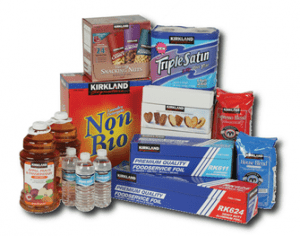
Trader Joe’s: The biggest secret
The master retailer of third-party manufacturers, Trader Joe’s orders most of its products for private labeling, even from companies like PepsiCo. Snyder-Lance also allows Trader Joe’s to rebrand its products, but these relationships are kept under wraps. Both suppliers and the Trader Joe’s stores are notorious for refusing to answer any questions about operations or manufacturers. Eater managed to reveal only a few examples in this article by requesting information from the FDA that allows them to track suppliers.
Whole Foods: 365 Everyday Value
Private-label brand 365 Everyday Value brings in 15 percent of Whole Foods’s annual revenue. In the first week of listing the product on the Amazon website, $500,000 of the products were sold, and online sales are expected to increase as more people recognize the quality and convenience of the brand. Food Navigator states that it is “highly credible with consumers” already.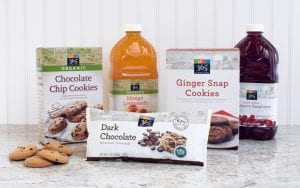
Many other stores, such as Walmart and Pams, also carry private-label brands. The numbers say it all: using private-label brands is a strong retailer strategy for maintaining customer loyalty in the changing retail dynamic.
Name brands have excellent opportunities to stand out. Check out our post about how national brands can compete with private labels.

